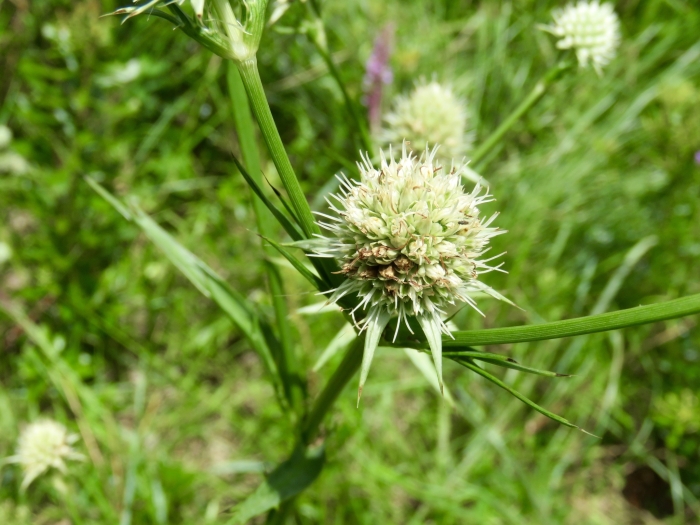Button Eryngo
(Eryngium yuccifolium)
Button Eryngo (Eryngium yuccifolium)
/
/

Laura Clark
CC BY 4.0
Image By:
Laura Clark
Recorded By:
Copyright:
CC BY 4.0
Copyright Notice:
Photo by: Laura Clark | License Type: CC BY 4.0 | License URL: http://creativecommons.org/licenses/by/4.0/ | Rights Holder: Laura Clark | Publisher: iNaturalist | Date Created: 2017-07-10T12:48:50-07:00 |


















































Estimated Native Range
Summary
Eryngium yuccifolium, commonly known as Button Eryngo or Rattlesnake Master, is a deciduous perennial herb native to grasslands, prairies, and open woodlands in the Central and Eastern USA. It can reach up to 1.8 m (5.9 ft) tall and is notable for its 10–40 dense, spherical umbels of flowers atop each stem. The flowers, blooming in July and August, are small (3–4 mm in diameter) with greenish-white or bluish-white petals and a faint honey-like scent, surrounded by spiny green bracts. The plant’s unique pollination strategy encourages cross-pollination and results in a high seed set of nearly 90%. Button Eryngo’s striking appearance and adaptability make it a popular choice for prairie restoration, native meadow projects, and ornamental gardens.
Button Eryngo thrives in full sun and well-drained soil, tolerating a pH range from slightly acidic to slightly alkaline. It is drought-tolerant once established and requires low to medium amounts of water. Overly moist conditions can lead to root rot, so it’s important to avoid overwatering. The plant’s deep taproot system means it should be left undisturbed once planted. It may self-sow in garden settings, and seeds require cold-moist stratification to germinate. This species is valued for its low maintenance, textural interest, and ability to attract pollinators.CC BY-SA 4.0
Button Eryngo thrives in full sun and well-drained soil, tolerating a pH range from slightly acidic to slightly alkaline. It is drought-tolerant once established and requires low to medium amounts of water. Overly moist conditions can lead to root rot, so it’s important to avoid overwatering. The plant’s deep taproot system means it should be left undisturbed once planted. It may self-sow in garden settings, and seeds require cold-moist stratification to germinate. This species is valued for its low maintenance, textural interest, and ability to attract pollinators.CC BY-SA 4.0
Plant Description
- Plant Type: Herb
- Height: 4-5 feet
- Width: 2-3 feet
- Growth Rate: Moderate
- Flower Color: Cream, Green
- Flowering Season: Summer, Fall
- Leaf Retention: Deciduous
Growth Requirements
- Sun: Full Sun
- Water: Medium
- Drainage: Slow, Medium
Common Uses
Bee Garden, Bird Garden, Border Plant, Butterfly Garden, Deer Resistant, Drought Tolerant, Erosion Control, Fragrant, Low Maintenance, Potted Plant, Rabbit Resistant, Rock Garden, Salt Tolerant, Showy Flowers, Street Planting
Natural Habitat
native to grasslands, prairies, and open woodlands in the Central and Eastern USA
Other Names
Common Names: Rattlesnake Master , Button Snake-Root , Button Snake Root , Yuccablättriger Mannstreu , Skallerormsmartorn
Scientific Names: Eryngium yuccifolium , Eryngium foetidum , Eryngium yuccifolium var. yuccifolium
GBIF Accepted Name: Eryngium yuccifolium Michx.